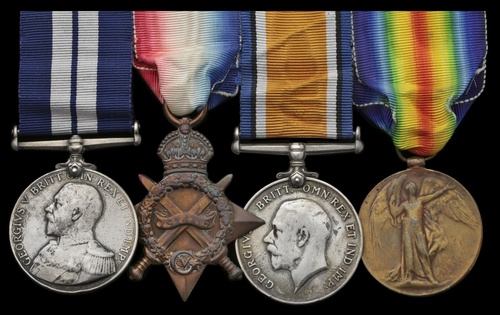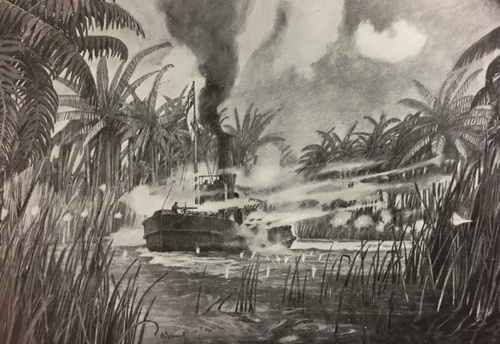Auction: 22003 - Orders, Decorations and Medals
Lot: 361
24 APRIL 1916: A GALLANT ATTEMPT TO SUPPLY KUT
'I am of the opinion that each officer and man has fully earned the Victoria Cross, but with the precedents before me of the award of this coveted decoration for combined efforts of this nature, I am led to believe that this will not be allotted to all ... Before closing my report, I would beg to put on record my appreciation of the gallantry of each one of these officers and men in undertaking this forlorn hope. They were under no misapprehensions as to the dangers they ran, and they knew that I considered it most unlikely that they would reach their destination and fulfil their task; and had it not been that I realised that it was the one and only chance of saving the garrison I would not have given my consent to such an undertaking …'
Vice-Admiral Sir Rosslyn Wemyss's report on Julnar's mission to Kut, refers.
An extremely rare Great War relief of Kut operations D.S.M. group of four awarded to Seaman J. Featherbee, Royal Naval Reserve, one of 15 men who volunteered to man the river steamer Julnar on a suicidal mission to get supplies through to the besieged town in April 1916
The calibre of courage displayed aboard the Julnar in her desperate mission led to her becoming one of the most decorated ships in the annals of the Royal Navy, her commanding officer, Lieutenant H. O. B. Firman, R.N., and second in command, Lieutenant-Commander C. H. Cowley, R.N.V.R., receiving posthumous awards of the V.C.; the latter - known to one and all as the "Pirate of Basra" - was subsequently murdered by his Turkish captors
Having then considered invoking Rule 13 of the V.C.'s warrant to reward other members of crew with the ultimate accolade, Their Lordships finally approved the award of the D.S.O. to Julnar's sole surviving officer, together with two C.G.M.s and ten D.S.M.s to her ratings
Distinguished Service Medal, G.V.R. (A 6973 J. Featherbee, Sea., R.N.R., H.M.S. "Julner", 24 April 1916), note spelling of ship name; 1914-15 Star (6973A J. Featherbee, Sea., R.N.R.; British War and Victory Medals (6973A J. Featherbee, Sea., R.N.R.), heavily polished, thus fine (4)
D.S.M. London Gazette 11 November 1919.
On 2 February 1917, the London Gazette had earlier announced the award of posthumous Victoria Crosses to Lieutenant H. O. B. Firman, R.N., and Lieutenant-Commander C. H. Cowley, R.N.V.R., for their conspicuous gallantry in an attempt to re-provision the force besieged in Kut-el-Amara. The circumstances behind the awards were reported by the G.O.C., Indian Expeditionary Force, in the following terms:
'At 8 p.m. on 24 April 1916, with a crew from the Royal Navy under Lieutenant Firman, R.N., assisted by Lieutenant-Commander Cowley, R.N.V.R., the Julnar, carrying 270 tons of supplies, left Falahiyah in an attempt to reach Kut. Her departure was covered by all artillery and machine-gun fire that could be brought to bear, in the hope of distracting the enemy's attention. She was, however, discovered and shelled on her passage up the river. At 1 a.m. on the 25th, General Townshend reported that she had not arrived, and that at midnight a burst of heavy firing had been heard at Magasis, some eight and a half miles from Kut by river, which had suddenly ceased. There could be but little doubt that the enterprise had failed, and the next day the air service reported the Julnar in the hands of the Turks at Magasis. The leaders of this brave attempt, Lieutenant H. O. B. Firman, R.N., and his assistant, Lieutenant-Commander C. H. Cowley, R.N.V.R. - the latter of whom throughout the campaign in Mesopotamia performed magnificent service in command of the Mejidieh - have been reported by the Turks to have been killed; the remainder of the gallant crew, including five wounded, are prisoners of war. Knowing well the chances against them, all the gallant officers and men who manned the Julnar for the occasion were volunteers. I trust that the services in connection of Lieutenant H. O. B. Firman, R.N., and Lieutenant-Commander C. H. Cowley, R.N.V.R., his assistant, both of whom were unfortunately killed, may be recognised by the posthumous grant of some suitable honour.'
John Featherbee was born in Folkestone, Kent on 30 April 1896 and enrolled in the Royal Naval Reserve in December 1914. Having then served in the river-class destroyer H.M.S. Teviot, he joined the Alert at Basra in April 1916, from which ship he volunteered to man the Julnar on her suicidal mission to Kut on the 24th.The Victoria Cross at Sea, by John Winton, takes up the story:
'As the months passed, the situation of the garrison in Kut deteriorated from unpromising to desperate. Several attempts were made to relieve the besieged troops. The last, in the S.S. Julnar, can really only be described as suicidal.
The river steamer Julnar was specially fitted with iron plating and sandbag protection at Amara. Her cabins, saloons and upper-deck stanchions were removed and her masts cut down. Her destination was supposed to be secret but everyone knew where she was going, including the enemy. Julnar was obviously the most forlorn of forlorn hopes but there were plenty of volunteers to go in her. Only bachelors were chosen: Lieutenant H. O. B. Firman, R.N., in command, Lieutenant-Commander C. H. Cowley, R.N.V.R., of the Lynch Bros. steamer Mejidieh as second-in-command, and twelve ratings chosen from the gunboats of the river flotilla. Julnar was loaded with 270 tons of desperately needed supplies for Kut where optimistic preparations were made to berth her near No. 12 Piquet, beside the fort.
Julnar sailed from Fallahiya at about 8 p.m. on the evening of 24 April 1916 under cover of the most intense artillery and machine-gun bombardment, to distract the Turks' attention. It was a dark night, slightly overcast, with no moon, but Julnar was discovered within half an hour by the light of star-shells. The River Tigris was high, because of spring floods and fast-flowing, so that Julnar could not make more than about six knots against the current, and allof Cowley's experience of those waters was needed to keep her in channel.
Considering the odds against them, Firman and Cowley got Julnar surprisingly far. They had twenty-five miles to go. They were riddled with machine-gun fire in the first few miles and came under heavy artillery bombardment at Es Sinn. But still Julnar survived and kept on steaming until she reached Magasis, where there was a fort, a sharp right-hand bend in the river, steel hawsers stretched across and the Turks waiting in force. Julnar arrived at about midnight and the Turkish guns opened fire at point-blank range. Her bridge was smashed and Firman was killed with several of his crew… '
At this point, with her rudder entangled in the steel hawsers, Julnar ground to a halt and became a sitting duck. VCs of the First World War: The Naval VCs, by Stephen Snelling, now takes up the story:
'With shells reducing her superstructure to matchwood, Cowley and Williams took cover for almost three-quarters of an hour while the bombardment continued unabated. Bullets by the score tore through the ship's hull to carpet the engine room. By the time the fire slackened, Julnar resembled a sieve. Her upper decks were 'absolutely riddled', her crankshafts were wrecked and the bridge was scorched and scarred by fire. But her Colours were never struck. Instead, remembered Able Seaman Bond, 'we watched them burn down.' Their fate no longer in doubt, Cowley ordered a white lamp hoisted as a sign of surrender, only to see it shot away. A red lamp was raised in its place, and, soon after, the firing ceased ... all hands were mustered on deck and taken ashore, to be greeted with the comment: "You are very brave fools; we knew you were coming 48 hours ago!" '
The following day, Lieutenant-Commander C. H. Cowley, R.N.V.R., known to the Turks as the "Pirate of Basra", and already condemned to death in his absence by a Baghdad military court on account of his pre-war employment in Basra and subsequent "offences" in command of the Mejidieh, was separated from his comrades. He was never seen again, the Turks reporting that he had been killed whilst trying to escape, but there is little doubt that he was shot down in cold blood after arguing with his interrogator.
Snelling continues:
'At the end of the war survivors of the Julnar emerged from an ordeal even more harrowing than the desperate mission to bring succour to Kut's defenders. Three men, Stokers Thornhill and Fox and Able Seaman Veale, died in captivity, the victims of callous Turkish neglect.'
Featherbee was repatriated via Alexandria in November 1918 and demobilised at Chatham in February 1919.
Subject to 20% VAT on Buyer’s Premium. For more information please view Terms and Conditions for Buyers.
Sold for
£6,000
Starting price
£2500









